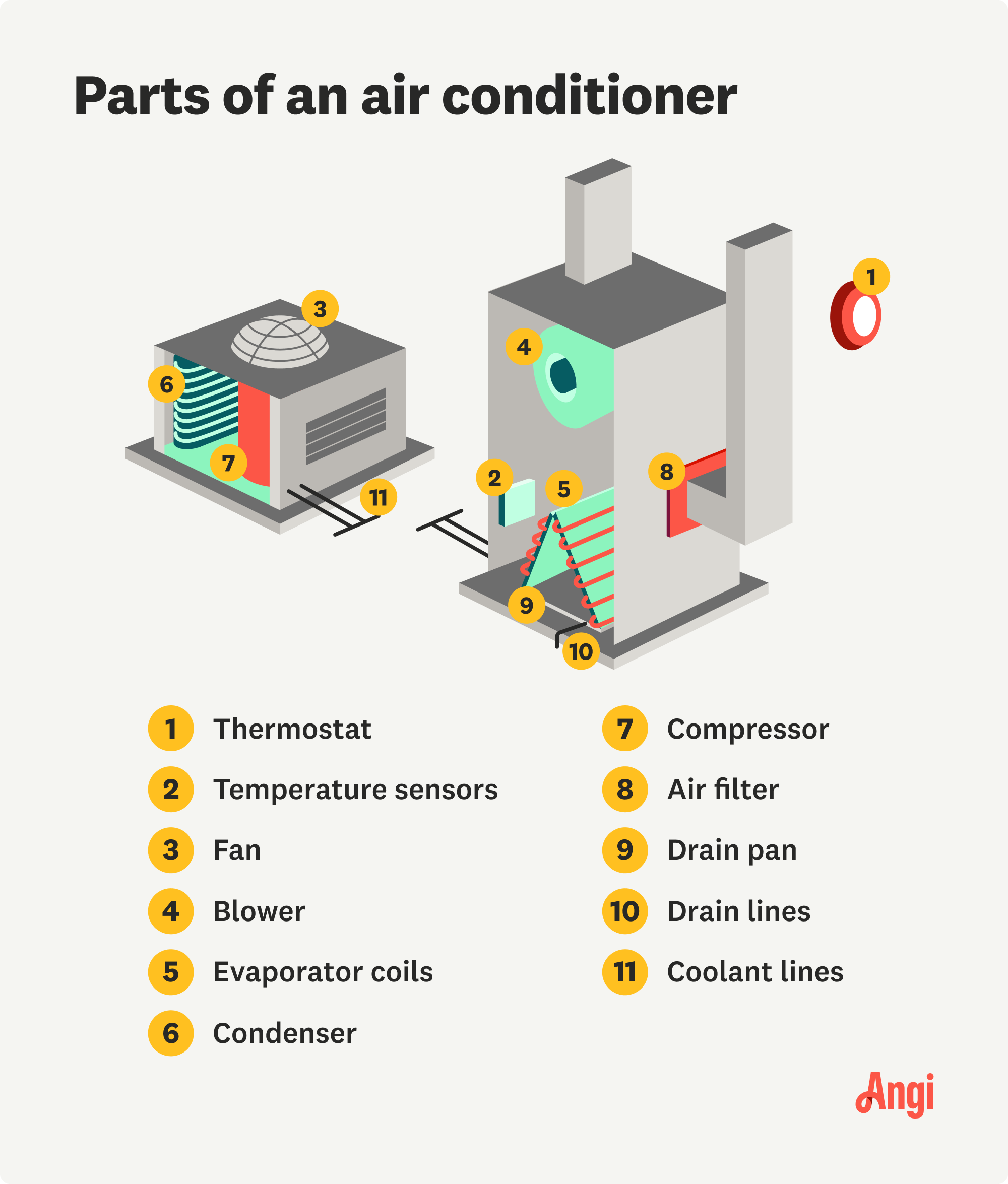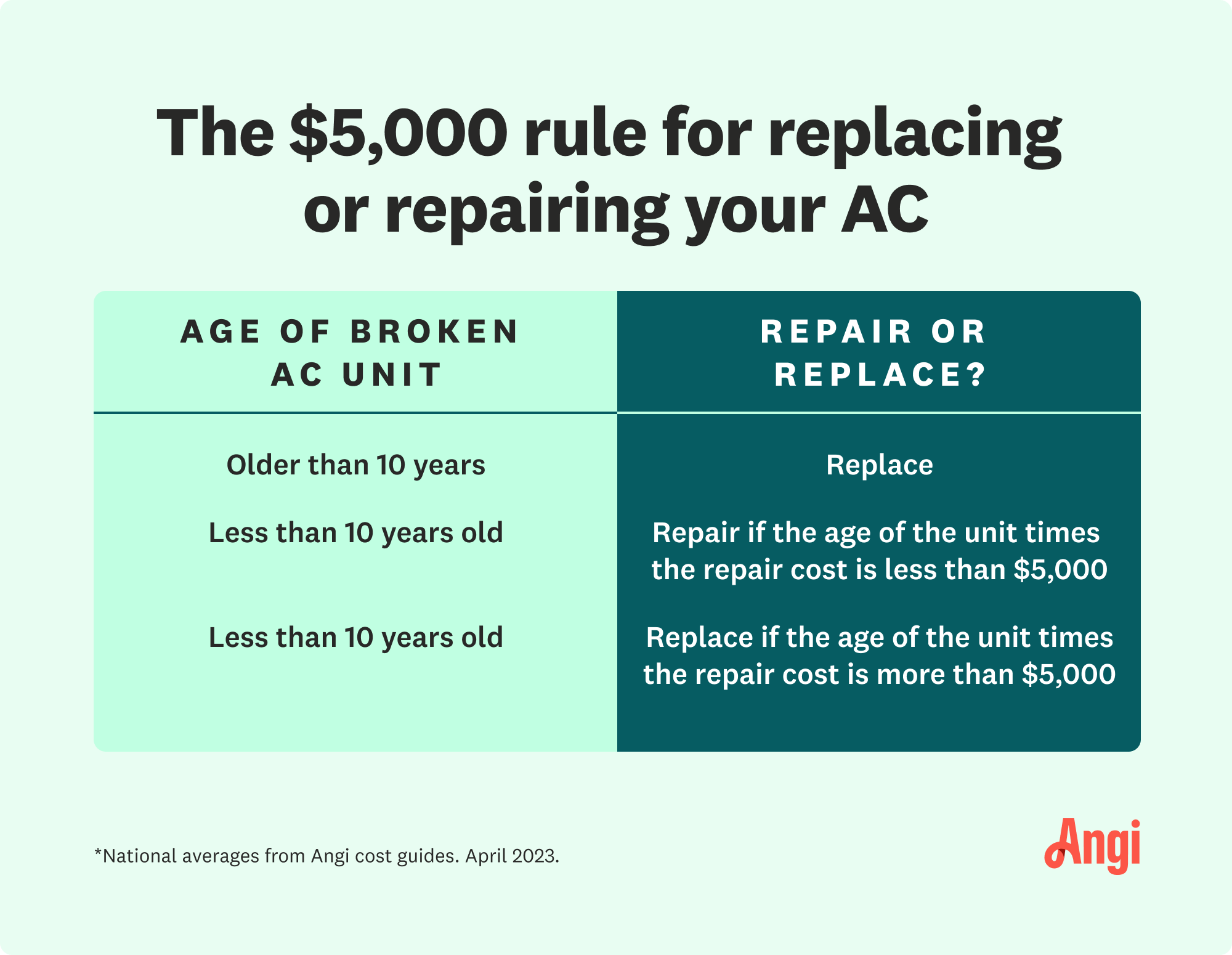How Does AC Work to Keep Your Home Cool?
What’s cooler than being cool? AC!


Air conditioning is a system that uses refrigerant to cool the air.
AC units also pull in warm air and disperse it outdoors.
Common AC types include window units, central air, and ductless mini-splits.
Air conditioners last 10 to 20 years.
Air conditioner installation costs $3,900 to $8,000 on average
You probably already know you have your air conditioner to thank for creating a cool, comfortable respite from the summer heat. But do you really understand air conditioning basics, like how AC works or what air conditioning really is? Where is that cold air coming from, and where does the hot air in your house go when you switch on the system? Let’s explore the frosty, fascinating world of air conditioning.
What Is Air Conditioning?
Air conditioning, or AC, is a system that cools the room temperature inside a home by removing warm air from the home and replacing it with cooled air. Air conditioning systems, at least as we know them today, were first invented by Willis Carrier (yes, that Carrier) in 1902. While a fan blows air around to create a breeze, air conditioning pulls in warm air and cools some of it using refrigerant. Then, the unit expels the remaining warm air outside before releasing the cooled air inside to lower the temperature.
How Does AC Work?

Air conditioning basics all boil down to removing warmer air from the home, passing it over cooling evaporator coils filled with refrigerant, then dispersing the warm air outdoors while a fan blows the cooled air back inside.
In more detail, the AC unit has temperature sensors and a thermostat setting that tell it when to kick on. When the sensors read that the room temperature has become warmer than the set temperature, they turn on the AC system.
The AC unit pulls in the warm air in a room, and this warm air passes over evaporator coils, one of many essential parts of an HVAC system. The evaporator coils contain refrigerant, which helps cool the air as it passes over the coils. The refrigerant, or coolant, becomes a warm gas as it heats up from the air. The compressor inside the AC unit then moves the refrigerant between the evaporator coils and condenser to cool the refrigerant back down and allow it to turn back to liquid.
Outside, the condenser releases the warm air that the AC unit collects. There’s a fan inside the AC unit that pushes the warm air to the condenser and a blower that pushes the cooled air back to the home.
Finally, AC systems include air filters to trap any particles, like dust or dirt, that may be pulled in with the warm air. You have to change air filters regularly, every one to three months, to avoid debris buildup that prevents the air from flowing through the system.
Types of Air Conditioners

There are many different air conditioner types to choose from to suit your household’s cooling needs. If you just need to cool a room or smaller area, a window unit or portable AC may be the right solution. Central AC works well for cooling the entire home via ducts. Or, there are ductless alternatives that can help provide a comfortable setting without the cost that comes with duct installation. Some common types of air conditioners include:
Central air: This is a quieter cooling system that connects to ductwork to move cooled air throughout the house, but it’s a big investment.
Window unit: This unit is budget-friendly and easy to install yourself, but it cools small areas and can be noisy.
Ductless mini-split: Multiple units can cool various parts of a home or apartment without requiring duct installation.
Portable unit: Portable AC units are budget-friendly and can quickly cool a small space, but they take up floor space and need to be placed near a window for ventilation.
Geothermal AC: This system can cool or heat the home using naturally cool or warm air from underground that the unit pumps into the home. It does require excavation, and installation is very expensive.
Air-source heat pump: Heat pumps are energy-efficient systems that can cool or heat the home. They can save you on monthly cooling costs but have a high upfront price.
Pros and Cons of an Air Conditioner
Air conditioning helps many people keep cool when temperatures rise in the summer, but these systems do have pros and cons to weigh before deciding whether to install.
Pros
When the outdoor temperatures are soaring, there’s no better feeling than turning on the AC and feeling an instant cooling breeze. AC units keep us cool and comfortable in the warmer months, and there are plenty of benefits you can enjoy from installing an AC. An AC system:
Quickly cools a room or entire home
Helps lower humidity levels
Has a variety of options to choose from for various cooling needs and budgets
Cons
While there are many benefits to installing an AC system to keep you cool, there are some things to keep in mind. If an AC unit isn’t right for you, you may consider utilizing fans and cross-breezes for a lower-cost cooling option. The cons of an air conditioner include:
Higher energy use
Higher installation and operating costs
May contribute to global warming, according to Mark Radka, Chief of the Energy and Climate Branch of the United Nations Environment Program
Cost of Installing an Air Conditioner
Installing an air conditioner costs $3,900 to $8,000 on average. Self-contained units cost less, but they tend to offer less cooling power and can only work in smaller spaces. More powerful units that can cool multiple rooms or the entire house tend to cost more upfront and can come with higher operating costs. While geothermal and air-source heat pumps can save you money on monthly heating and cooling costs, they cost more to install.
Air Conditioner Installation
Many people can install certain types of AC units, like a window unit or portable AC, themselves. However, finding the right size air conditioner for your home to avoid overpaying on cooling costs is just as important as installing the unit correctly. A local air conditioner installer can help you determine what size AC unit will best meet your cooling needs.
Installing an air conditioner incorrectly can lead to increased energy bills, AC unit leaks, or more wear and tear on the system’s parts, which is why it’s always best to leave this job to a pro.
What Is the Life Span of an Air Conditioner?
The average life span of an air conditioner is 10 to 20 years, but how long your AC unit lasts depends on how it was installed, usage, and how well you maintain the system.
First, hire a pro to install the unit so that everything is shipshape. If possible, avoid running the AC unit constantly. Instead, allow it to follow a set temperature, where it will simply kick on to cool the home whenever the room temperature begins exceeding the set temperature. Finally, keep up with regular maintenance, like cleaning the unit, changing the air filters, and scheduling annual inspections by a pro.
Air Conditioner Maintenance
Air conditioner maintenance is key to prolonging the usefulness of your AC system. Annual air conditioning services are important for catching any potential problems before they become a big (and costly) deal. Be sure to hire an HVAC pro to take a look at your AC unit at least once per year. It’s useful to buy an HVAC service contract if you’re installing a new AC system, as these deals can help cover the cost of regular tune-ups, seasonal maintenance, and even some repairs.
Call a pro with any questions you have about your system, even if they're general questions. The more informed you are about your system, the better it will work and the better that pros can help you with it.
Aside from professional maintenance, there are several ways you can care for your AC unit. First, turn off the AC before performing any maintenance. Then, you can:
Change the air filter: Change the air filter on the AC unit every one to three months.
Clean the coils: If you have the safety equipment and tools needed, you can clean AC coils like a pro. If you don’t have the right gear, go ahead and actually call a pro, though.
Clear debris around the AC unit: Leaves, twigs, and other debris can build up around the outside AC unit (if you have central air). Clear away this debris as needed.
Check the fans: Check for any dirt or debris clogging up the fans inside the AC unit, and use a clean, dry cloth or brush to wipe the fans down so they can properly move the air around.
Fix the fins: You can use a butter knife or a fin comb to straighten any misshapen fins on the back of an AC unit.
When to Repair vs. Replace an AC Unit
If you notice your AC unit isn’t running properly, you may be considering whether it’s time to repair versus replace the air conditioner. If your cooling system is more than 10 or 15 years old, it’s likely going to be more cost-efficient to replace it rather than pay for repairs when it’s already so close to the end of its life span.

You can also follow the “$5,000 rule.” If you receive a repair quote, multiply the cost of the repair by the number of years in age your AC unit is. If the cost is over $5,000, you may want to replace the whole thing instead of making a repair. Otherwise, if you find that your AC unit requires frequent repairs, it’s best to go ahead and replace it.
While many issues with AC units can be repaired by installing a new part, if the problem is the AC’s compressor, it may be best to replace the entire system. If your AC unit isn’t very old and the compressor fails, check your warranty, as it may cover the cost of replacement.
If you’re still not sure whether to replace the whole air conditioner or not, hire an AC repair pro to take a look. They can give you advice on the best next steps.





- Furnace Repair
- Air Conditioning Repair
- HVAC Repairs
- Furnace Installation
- Wood & Pellet Stove Repair
- Dehumidifier & Humidifier Repair
- Heat Pump Companies
- Swamp Cooler Repair
- Wood Stove Services
- HVAC Companies
- Commercial A/C Repair
- Geothermal Installation
- Air Conditioning Installation
- Boiler Repair
- 24 Hour Furnace Repair
- Geothermal Repair
- Heat Pump Repair
- Humidifier Installation
- Thermostat Repair
- Thermostat Installation
- Nest Installation
- Heating & Cooling
- Heating Repair
- Furnace Cleaning
- Furnace Tune-Up
- HVAC Technicians
- Subcontractors
- Furnace Maintenance
- Plumbing & Heating Companies
- Wood Stove Inspection
- Mini Split Installation
- Wall Heater Repair
- Duct Installers












